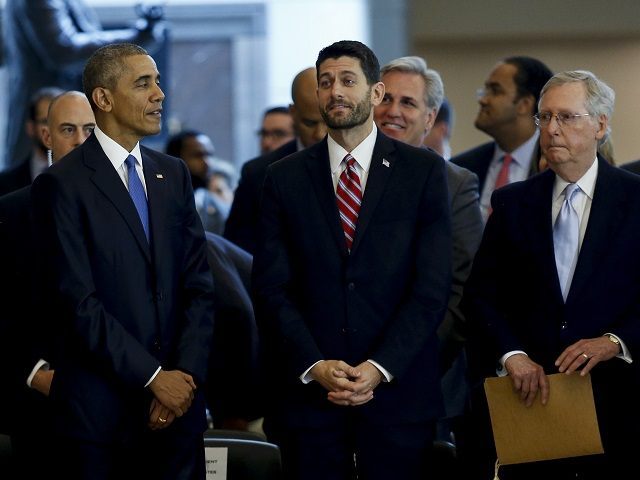William Wolfe, deputy director of government relations at Heritage Action for America, explains why “members of Congress vote for bills they disagree with in principle, practice, and policy” to appease the Establishment.
From Daily Signal:
Last week, as the national media obsessed over President Barack Obama’s Supreme Court nomination, two conservative lawmakers did exactly what they were supposed to do: Listen to their constituents.
Despite intense pressure from House leadership, Rep. Dave Brat, R-Va., and Rep. Marlin Stutzman, R-Ind., stood alone in voting against advancing the flawed fiscal year 2017 (FY17) budget resolution out of the House Budget Committee.
As Heritage Action argued:
“The House’s budget should be an opportunity for House conservatives to lay out their spending agenda for the year. Instead, this budget concedes on the FY17 spending levels laid out in last year’s Bipartisan Budget Act (BBA). Conservatives should reject this budget and insist that the House revert back to the previous discretionary spending caps of $1.040 trillion.”
Despite valid policy concerns and public opposition from the Republican Study Committee and the House Freedom Caucus, House leadership and Budget Chairman Rep. Tom Price, R-Ga., pushed ahead with a budget that would lock in the Boehner-Obama budget levels established last fall over the objection of 167 House Republicans.
Leadership’s insistence on passing a budget that ratified elevated spending levels opposed by conservatives put the seven members from the House Freedom Caucus, as well as other conservatives that serve on the Budget Committee, in a difficult position.
In 2012, when Rep. Tim Huelskamp, R-Kan., and Rep. Justin Amash, R-Mich., voted against a then-Chairman Paul Ryan’s, R-Wis., budget resolution, they were promptly removed from the committee.
When Brat and Stutzman decided to side with their constituents over their party’s congressional leadership they did so with this history in mind. It was a principled position—and their constituents should be proud.
The entire episode also shed light on an uglier problem in Washington that has serious policy implications. On a weekly basis, Members of Congress vote for bills they disagree with in principle, practice, and policy—and their constituents would too—because they are being “team players” and making the legislative process “work.”
Here’s how it works at the committee level.
Read the rest of the story here.

COMMENTS
Please let us know if you're having issues with commenting.